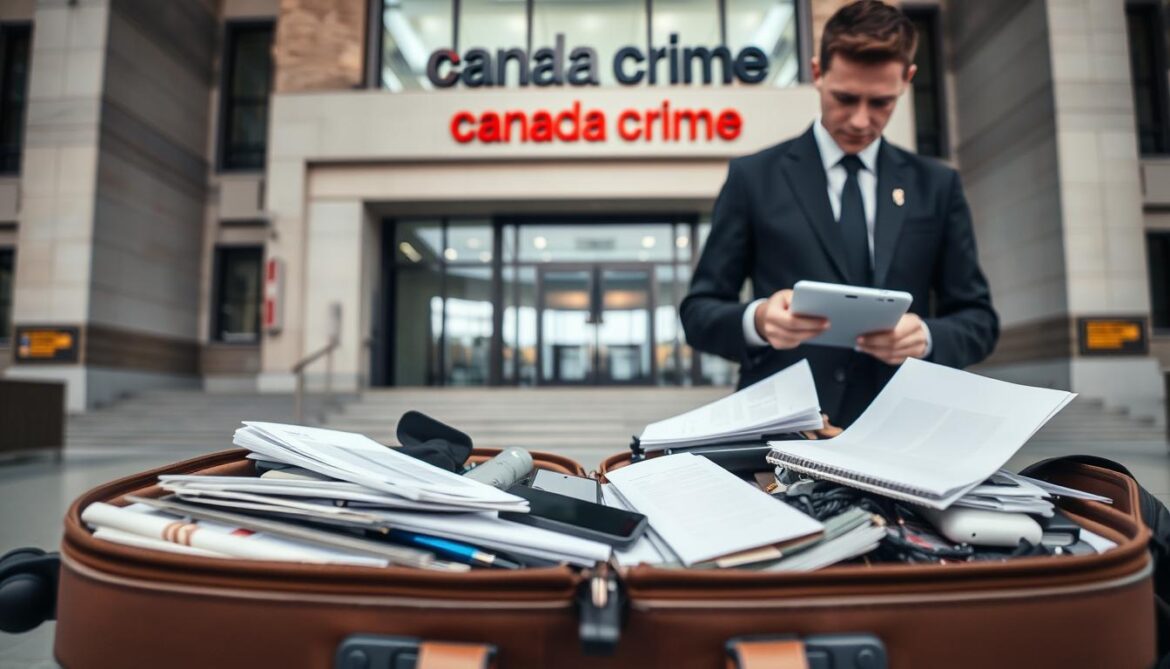Did you know that over 4,000 customs violations happened in Canada in 2021? These violations led to penalties of more than $50 million. It’s crucial to follow customs regulations closely. This helps avoid fines, loss of the right to import, or even criminal charges.
Understanding and following international trade laws is key to compliance. Importers and exporters should be open and careful in their business. This protects them from the big penalties of customs violations.
Having the right customs compliance plans is very important. This ensures imports and exports go smoothly without breaking any rules.
Understanding the Basics of Customs Compliance
Customs compliance is key for businesses in international trade. It means understanding and following various customs laws and regulations. By using effective prevention techniques and staying updated, companies can avoid violations and penalties.
What is Customs Compliance?
Customs compliance includes all the rules businesses must follow for legal import and export. This covers proper documentation, accurate tariff classification, and following trade agreements and safety standards. Following these rules is crucial for preventing legal issues.
Importance of Adhering to Customs Regulations
Following customs regulations is important for many reasons. First, it keeps illegal and unsafe goods out of the country. This protects consumers and national security.
Additionally, it ensures fair trade by making everyone follow the same rules. This stops unfair competition. By using customs tips, businesses can dodge fines, delays, and losing their goods. These issues can badly affect their operations and reputation.
Common Customs Act Violations in Canada
In Canada, people and companies must follow the crime code under the Customs Act. Knowing common violations helps stay in line with the law and avoid big fines. We will look at three main types: negligence, gross negligence, and fraud.
Negligence
Negligence means not being careful enough with customs rules. This can be wrong paperwork or not stating goods correctly. Those who make these mistakes could pay fines and face other penalties, as the laws say.
Gross Negligence
Gross negligence shows a clear neglect for the rules. It’s when someone knowingly breaks the customs laws. If caught, they face tougher punishments, like higher fines or even jail, according to Canada’s legal system.
Fraud
Fraud is the worst kind of customs violation in Canada. It means lying or using tricks to skip customs duties or rules on what can come in or out of the country. Those caught doing fraud face the strictest punishments, including big fines or jail time. More details are in the country’s crime code.

Tips to Prevent Customs Act Violations
Ensuring compliance with customs regulations is essential for businesses in international trade. These practical tips can help avoid violations and penalties.
Know the Regulations
Understanding customs regulations is key. Be well-informed about the latest rules from the Canada Border Services Agency (CBSA). Regularly update your knowledge to stay compliant. Use resources like Informed Compliance Publications to remain up-to-date.
Exercise Reasonable Care
Exercising reasonable care in your customs dealings is crucial. Make sure all paperwork is accurate and complete before submitting it. Avoid errors by double-checking all entries, which can help dodge delays or fines.
Use trustworthy strategies for avoiding import duties and taxes. This minimizes costs while keeping you compliant.
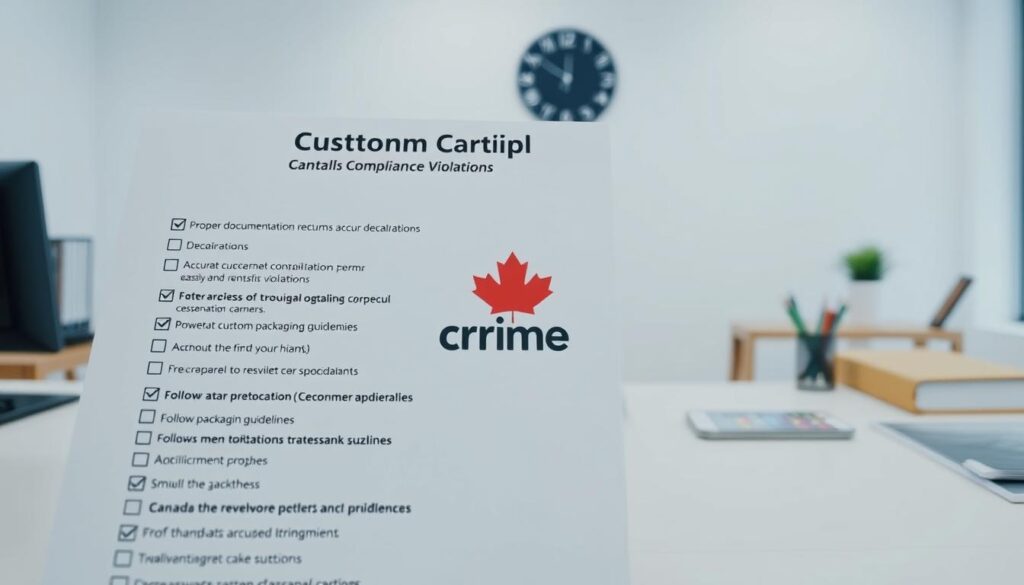
Be Transparent and Honest
Being transparent and honest with customs is critical. Always disclose mistakes immediately. This can help prevent small issues from becoming bigger problems.
By following these tips for customs compliance, you can be seen as a reliable importer or exporter. This also helps in using import duties and taxes avoidance strategies efficiently.
The Consequences of Customs Act Violations

Breaking the Customs Act in Canada can bring serious trouble. You could face many penalties, like big fines or even criminal charges, based on the crime’s details. The crime code puts these violations in different categories, each with its own legal punishment.
Financial penalties can be a big blow, leading to large fines. If you’re caught in fraud, your goods might be taken away. Losing your goods can hurt your business’s money flow and mess up how your business runs.
Facing criminal charges is another risk. In serious situations, you might end up in court and possibly go to jail. Having a criminal record can make doing business harder later on and ruin your business’s good name.
Also, your business might face import restrictions if found guilty. These limits can make international trade tough, slowing down your business’s growth and profits.
The damage from breaking these laws affects more than just money and legal issues. It can harm your company’s reputation, making it hard to work with partners, customers, and others. Winning back their trust can take a lot of time and effort.
| Violation Type | Possible Consequences | Crime Information |
|---|---|---|
| Financial Violations | Hefty Fines, Confiscation of Goods | Fines related to crime code 123 |
| Severe Offenses | Criminal Charges, Imprisonment | Crimes under crime detail 456 |
| Fraudulent Activities | Import Restrictions, Reputation Damage | In-depth crime information |
How to Create a Customs Compliance Plan
Creating a strong customs compliance plan involves setting up clear strategies that meet legal rules and getting everyone involved. It’s essential that everyone in an organization knows what they need to do to follow customs laws. In this section, we’ll guide you through the steps to make and use a detailed customs compliance plan.
Steps to Developing an Effective Compliance Strategy
To create a customs compliance plan, you need to follow certain steps that cover the whole import-export process. This includes:
- Comprehensive Training for Staff: Make sure all workers know the customs compliance rules well.
- Regular Audits: Check your customs activities regularly to find and fix any problems quickly.
- Implement Checks and Balances: Put a system in place to keep an eye on compliance and fix any issues that come up.
By doing these steps, you can create a solid customs compliance plan that lowers risks and makes your operations run smoother.
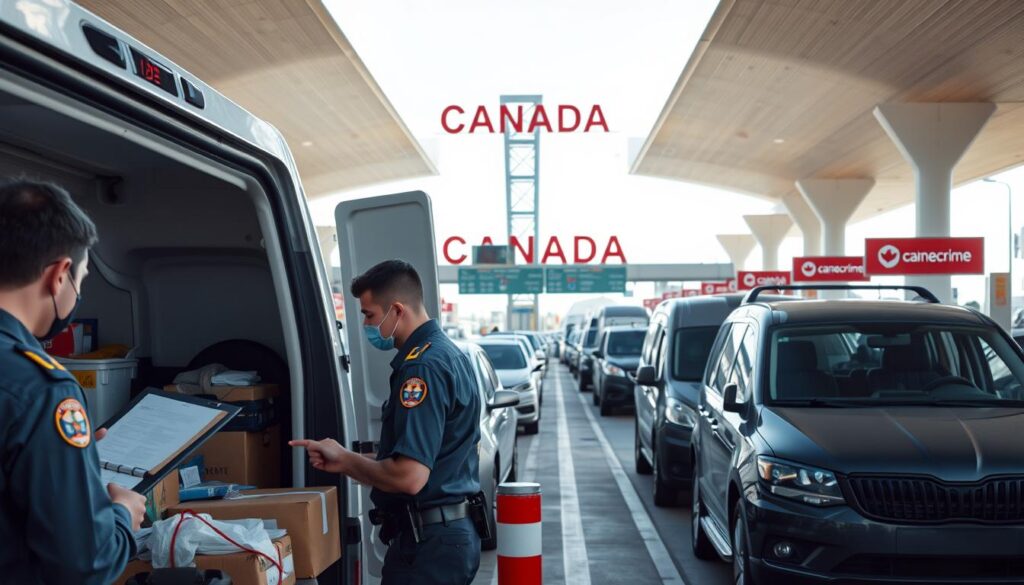
Involving Key Stakeholders
Getting key stakeholders involved is key to a successful customs compliance plan. This group includes management, compliance officers, and the people who handle daily operations. When everyone works together, it makes it easier to follow customs rules and understand why they are important.
Having regular meetings and clear ways to talk to each other helps build a compliance culture. It also makes it quick to deal with any problems and keep everyone working together. Here’s a list of the main stakeholders and what they are responsible for:
| Stakeholder | Responsibilities |
|---|---|
| Management | Providing resources and support for compliance initiatives |
| Compliance Officers | Overseeing compliance activities and ensuring regulations are followed |
| Operational Staff | Implementing day-to-day compliance practices |
Key Customs Compliance Best Practices
It’s very important to follow customs rules correctly for easy import/export activities. By using good compliance strategies, you can avoid high fines and hold-ups. Here are key tips for customs compliance to add to your daily routine.
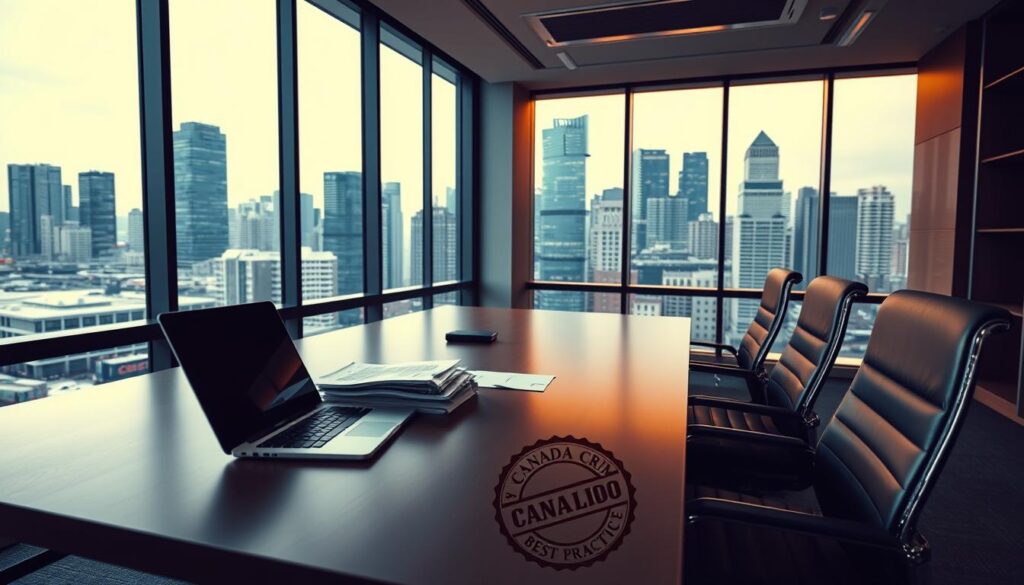
Accurate Documentation
Keeping precise records is a top rule for customs compliance. Make sure to record all deals carefully. Your invoices and packing lists should be without mistakes. Doing this helps customs go smoothly and reduces rule-breaking risks.
Proper Classifications and Declarations
It’s critical to classify goods correctly and declare them truthfully. Accurately use Harmonized System (HS) codes for product classification. Correct classification makes sure the right duties are applied and avoids issues from wrong declarations.
Timely Submission of Required Documentation
It’s key to send required documents on time. Being late can cause delays and more checks, and you might have to pay fines. To prevent this, have a good system for on-time document submission. This method is a great tip for customs compliance and helps goods move smoothly across borders.
The Importance of Ongoing Training
It’s crucial to keep teaching your team new things, especially about customs compliance. With regular training, your employees learn what they need to follow customs rules well. This helps avoid problems with not following these rules and keeps your team careful and accurate.

Training Programs for Employees
Offering varied and thorough training is key to making sure your team knows about customs. These training sessions should go over how customs work, what paperwork is needed, and how to categorize goods correctly. Using both online and in-person training will meet everyone’s learning needs.
Staying Updated with Regulatory Changes
The rules for customs change all the time, so it’s important to stay current. Regularly check sources like Jori Logistics for the latest on customs. Also, setting up alerts and signing up for newsletters makes keeping up easy.
Leveraging Technology for Better Compliance
Modern technology can make your customs compliance easier. Using electronic systems helps keep customs information accurate and up-to-date.

Using advanced technology cuts down on human mistakes, a major source of compliance problems. Tools that automate can check if documents are right, classify goods properly, and make sure everything is submitted on time.
Now, let’s see how technology can make compliance better:
| Technology | Benefits |
|---|---|
| Electronic Data Interchange (EDI) | Streamlines communication between trading partners & customs authorities, ensuring accurate and timely data exchange. |
| Compliance Management Software | Automates the tracking of import/export compliance strategies, reducing manual workload. |
| Blockchain | Provides a secure and transparent method for verifying the authenticity of documentation and tracking goods through the supply chain. |
| AI and Machine Learning | Enhances predictive analysis of compliance risks, improves accuracy in classifying goods, and ensures efficient decision-making processes. |
By using these technologies, companies can improve their customs compliance and work more efficiently. Investing in technology is a smart move for smooth compliance.
Customs Broker: A Key Partner in Compliance
Working with a customs broker is crucial in international trade. They play a key role in keeping your operations smooth. They know a lot about customs laws. This helps avoid problems and keeps your business running right.

Benefits of Working with a Customs Broker
Working with a customs broker has many benefits. These benefits help your import and export processes.
Key benefits include:
- Expert Knowledge: Customs brokers know a lot about customs laws. They guide you well and keep you from making mistakes.
- Efficient Documentation: They handle lots of paperwork correctly and on time. This keeps you in compliance.
- Risk Mitigation: Brokers spot problems before they happen. This reduces the risks of not following the rules.
How to Choose the Right Customs Broker
It’s important to pick the right customs broker for your business. Here are some things to think about:
- Experience and Expertise: Choose brokers who know your industry well. They’ll understand your specific needs better.
- Reputation and Reliability: Look at reviews and get advice to check the broker’s reliability. A good broker has a history of following the rules well.
- Technological Proficiency: Make sure the broker uses modern technology. This makes things more efficient and helps follow the rules better.
Making a smart choice in picking a customs broker helps you follow the rules. It lets you focus on growing your business.
| Criteria | Importance | Questions to Ask |
|---|---|---|
| Experience and Expertise | High | Do they have clients in our industry? |
| Reputation and Reliability | High | Can they provide references or case studies? |
| Technological Proficiency | Moderate | What technology systems do they use? |
Dealing with Customs Violations: Steps to Take
When you might have customs violations, it’s key to act quickly and with a plan. It’s important to tell customs about any issues right away. This helps keep problems small.
Making a Prior Disclosure
Telling customs about mistakes in your paperwork before they find them is smart. It shows you want to follow the rules. This can also mean you pay less in fines.
Communicating with Customs Authorities
If there’s an issue, talk openly with customs officials. Being clear and sharing needed information helps. This shows you respect the rules and want to fix problems together.
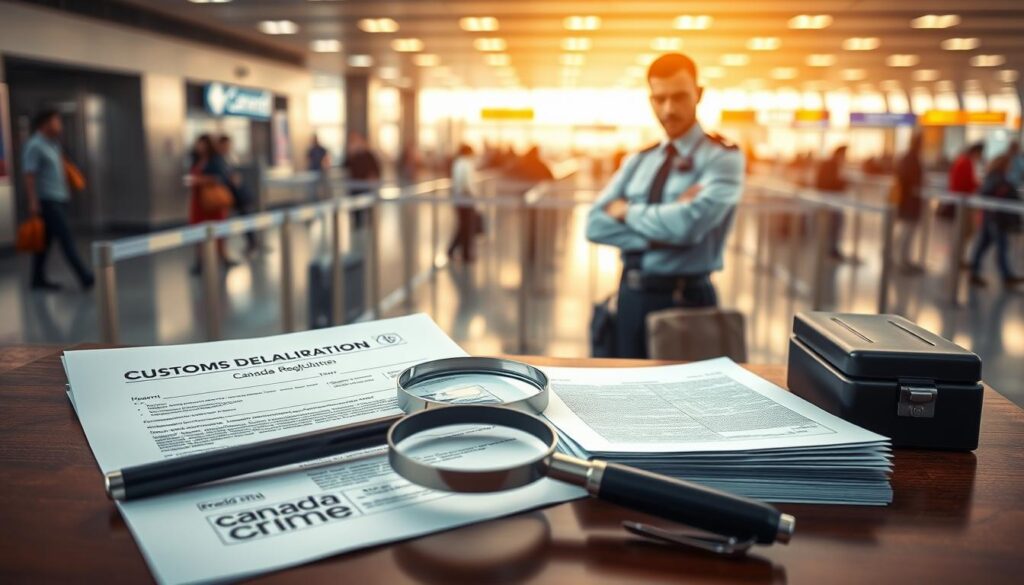
Conclusion
Following customs laws is key for smooth trade across countries. Knowing the rules and using experts like customs brokers can prevent problems. This builds trust in the global market. Taking steps to comply with customs helps your business manage the challenges of trading internationally.
To avoid breaking Customs Act rules, use this guide. Teach your team the value of correct paperwork and timely processes. Using tech to oversee compliance helps you keep up with laws and avoid mistakes.
Creating a good customs compliance plan means you must always be learning and adjusting. Working with customs brokers gives you access to necessary knowledge for handling tough rules. With these steps part of your daily work, your business can succeed globally.

